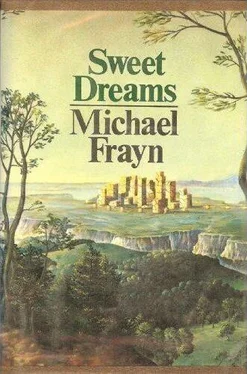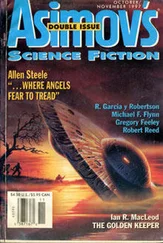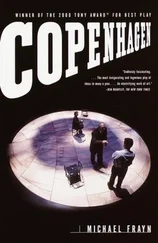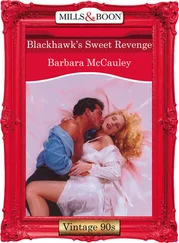“What I’m aiming at,” says Howard, “is not some kind of thing where everybody is, you know, just sort of happy and sort of contented sort of thing all the time….”
The phone rings.
“Who did you say?” says Bill into the phone in a teasing voice, without taking the pipe out of his mouth, and looking blankly at Howard as he talks, as somewhere to rest his eyes. “Biba? That’s a very pretty name. Did you think that up yourself …? No, I’m kidding, Biba…. You know what, Biba? I don’t know who you are and I can’t understand what you’re trying to tell me, but you have a very beautiful telephone voice, and I believe you have saved my life…. No, I mean that, Biba, because I am sitting here totally alone, going slowly out of my mind. I have influenza and pains in my stomach. I’m dying, Biba. What is this terrible place …? Of course I’d love you to stop by, Biba…. Bless you, Biba, bless you. An old man’s blessing on your head.“
He puts the phone down.
“Go on,” he says to Howard.
“I’m sorry,” says Howard. “I didn’t know you were ill.”
Bill Saltman lifts his shoulders very slightly.
“It’s the pills,” he says. “The green-and-white pills I was prescribed in Athens. They don’t go with the red pills I got in Miami. Go on.”
“Well,” says Howard, “I think the thing we want to avoid at all costs — I mean, I really feel quite strongly about this — is setting up some kind of Utopia — some kind of oversimplified Arcadia which wouldn’t stretch the imagination of the …”
The phone rings.
“Is this Jane?” says Bill Saltman. “Oh, Gayle … You waited in the bar till midnight …? Honey, I’m sorry. I had to go to Tangier. Then I had to go to Miami. Then I had to go to Hawaii. Then I just felt so tired I thought I’d have an early night. Well, come by around six, Gayle — I’m in a meeting for the next two three hours.”
He turns back to Howard.
“So …?”
“So what I think we’ve got to do,” says Howard, “is to set up a society where everyone has enough sort of … contentment… to be sort of contented, but not so much that they can’t see that all this sort of contentment is sort of blinding them to the possibility of becoming sort of more contented in a sort of kind of deeper sort of …”
The doorbell rings. It’s Biba. She is ridiculously young and pretty, and flustered to find two of them.
“Excuse me, Howard,” says Bill. “Could you look back at five, say? I have a conference at six, but we could get in one hour’s work, at any rate. I think we should make a serious effort to get some progress on this thing.”
Howard can’t help laughing to himself as he goes down in the lift. What a world he’s got himself into now! Bill Saltman is a fantastic character — the kind of quirky, tiresome man who actually gets extraordinary things done; the kind of man who is so implausible as the director of the New Jerusalem that you feel he really might just possibly bring it off.
Howard strolls up Sixth Avenue in the afternoon sunlight. How far he has come since the days in Harry Fischer’s office above the tobacconist’s, with the cosy office jokes and the lunch-time beers in the pub! Now he is in a world where it’s nothing to fly to the Bahamas for a conference — and for a conference that’s probably not even going to be in the Bahamas; a world where very high-class girls ring up uninvited and try to make you feel at home.
His life has a vertiginous sense of development and purpose.
“I’ve been thinking,” says Bill Saltman when Howard returns at five o’clock. He is smoking his curly pipe still, but is now wearing only a Turkish bathrobe and Persian slippers. There is no sign of Biba. A stuffiness lingers in the air — an overbreathed smell. He turns on the air-conditioner. The stale smell is replaced by a dank smell.
“I’ve been giving it a lot of thought,” he says slowly, chewing on the pipe, and smoothing the glossy black hair above the drooping face. “I think I know where we’ve gone wrong. The thing is this, Howard. You’ve told me a lot about your ideas, and I’ve enjoyed sitting here listening to them. But tell me one thing, Howard. What’s the story?”
“The story?” says Howard. He jumps up from the day-bed on which he has just sat down. “Well …”
Bill Saltman holds up his hand.
“Just a moment, Howard. Would you excuse me for a moment? I have to take a shower. I’m awfully sticky.”
He disappears. Howard sinks back onto the day-bed. The story? He’s never thought about it like that. A story … But this might be a good way to look at it — not as something static, but as a scenario, a sequence of events, a developing situation, something existing in a temporal dimension! He goes to the Chinese desk, and takes a sheet of paper out of the Mexican paper-rack.
Bill Saltman’s head appears round the door, with fingers of wet hair hanging over his leathery brown forehead.
“So what’s the story, Howard?” he demands.
“I’m just writing it.”
“Tell it me. I’ve left my reading glasses in Bangkok some place.”
“Well,” says Howard, jumping up, and beginning to walk up and down, “it’s the story of this society, where everyone begins to get more and more aware of its real nature, and …”
“In two words, Howard. I’m standing here with water running off me.”
“Well, people begin to make a structural analysis….”
“Hold it. I’ll put some clothes on.”
When he comes back he is wearing a shirt and a pair of socks held up by suspenders.
“I’ll tell you what a story is, Howard,” he says. “A story is when something happens. A story is when someone’s trying to do something, and someone’s trying to stop him. So, wham, there’s a fight on.”
“Yes, well …”
“A story is when this McTavish you have in the book — we’ll have to change that name, by the way — they’ll never believe it — they’ll arrest you….”
“It’s McKechnie.”
“That’s worse. A story is when McTavish wants to build a better world for everyone — just like you have it in the book, I don’t want to change anything — and the local hoods jump on him. Or his wife, even — she turns against him. How about that, Howard? His wife, his own wife! That could be good. ‘Oh God, Mary!’ says McPherson. ‘O God, Mary!’ — his voice is breaking with emotion — ‘Oh God, Mary, I don’t want our kids to grow up in a world like this, with man an enemy to man, and cats crawling all over the books, in a cold-water walk-up behind the subway depot. I want a decent world where a man can stand on his own two feet, etcetera, etcetera, etcetera.’ ”
“Yes, well …”
“Listen, Howard. And Mary says, ‘Don’t make trouble, Lester! You’ll lose your job! Haven’t we always been happy together the way we are? You testify before the Commission tomorrow and I take the kids and go home to Mother in Milwaukee!’ Now, that’s a story , Howard!”
“But isn’t this going to lead to violence, and, and …”
The doorbell rings.
“Let her in, Howard, while I put my pants on. I’ll see you tomorrow, at twelve o’clock, and maybe we can get in an hour’s work before lunch.”
So this is how it’s going to be, thinks Howard, as he rides down in the lift again. An exhilarating struggle between the abstraction and intellectuality of his concept, and the strong vulgarity, the earthy vigour, of Bill Saltman’s. This is the way things are created! How in-turned and etiolated and overeducated Harry Fischer’s design team seems now! It was only too appropriate that they were designing inert masses of rock with their noses in the air, and snow on them.
Читать дальше












